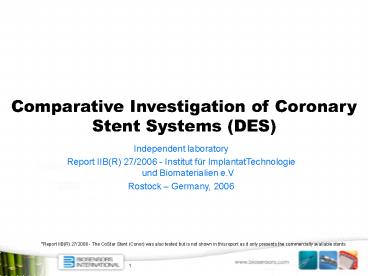Independent laboratory - PowerPoint PPT Presentation
1 / 21
Title: Independent laboratory
1
Comparative Investigation of Coronary Stent
Systems (DES)
Independent laboratory Report IIB(R) 27/2006 -
Institut für ImplantatTechnologie und
Biomaterialien e.V Rostock Germany, 2006
2
Test Samples
- All stents were DES systems
- The study included the balloon-expandable
coronary stent systems according to the table
below. - All stent systems were provided as complete
systems with the stents pre-mounted on balloon
catheters.
3
Key Highlights
4
Side branch access
- Explanation
- Measurement of the largest possible opening in
the stent structure which could be used for side
branch access - Diameter measured in mm
- Large diameter ? good side branch access
5
BioMatrix demonstrated the best side branch access
Diameter of the largest possible opening in the
stents as a measure of side branch accessibility
Taxus Liberté 3.0 x 16 mm
BioMatrix 3.0 x 14 mm
6
Radial strength
- Explanation
- Scaffolding provided by the stent to support the
narrowed artery - Measured as the pressure at which the stent will
collapse - High collapse pressure ? high radial strength
7
BioMatrix demonstrated excellent radial strength
Collapse pressure of the expanded stent as the
measure of radial strength
8
Stent profile
- Explanation
- Mean diameter of the stent mounted on the
delivery system - A mean value calculated from stent diameter
measurements taken over the entire stent length - Low stent profile ? considered good crossability
9
BioMatrix is competitive in terms of stent profile
Stent profile of crimped stents as mean values
over the entire stent length
10
Crossability
- Explanation
- Ability of the stent to cross a stenotic lesion
using an artery model - Measured by the mean distal force required to
cross the stenotic lesion - The less force needed, the better the performance
in terms of crossability
11
BioMatrix demonstrated excellent crossability
Mean distal Force Fdist of crossability test,
stenosis model type 2,d1.4mm, as a measure of
crossability
12
Trackability
- Explanation
- Ability of the catheter to track along the guide
wire - (Total distance of advancement in testing
for all stents 220mm) - Measured by the force needed to track along the
guide wire - The less force needed, the better the performance
in terms of trackability
13
BioMatrix performed best in Trackability
Allowing navigation through tortuous anatomy
Mean track force Fprox as a measure of
trackability (coronary vessel model, path5)
14
Foreshortening
- Explanation
- Change in stent length after expansion
- Measured in of length change
- Positive means the stent length increases
- Negative means the stent length decreases
- low of change ? small change in stent length
15
BioMatrix demonstrated the smallest length change
to allow for more accurate stent placement
Test results for the stent length before and
after expansion
Length change of stents due to expansion (a
negative sign means a stent shortening)
16
Elastic recoil
- Explanation
- Elastic relaxation of stent after expansion e.g.
ability of the stent to spring back after
expansion - Measured as the difference between the stent
diameter at deployment and after deflation of the
balloon. - The smaller the change in diameter , the lower
of stent recoil
17
BioMatrix demonstrated a low elastic recoil to
ensure complete stent apposition
18
Radiopacity
- Explanation
- Ability to see the stent on an angiogram (X-ray)
- X-ray (angiogram) imaging of both the crimped
stent and the stent deployed, assessed by a
measure of visibility
19
BioMatrix demonstrated good visibility to
ensure precise stent placement
20
The BioMatrix stent platform demonstrates
superior performance over market leading products
in several performance characteristics
21
Rue de Lausanne 29 1110 MORGES
Switzerland Tel. (41) 0 21 804 80 00 Fax (41)
0 21 804 80 01 customer_at_biosensors.com































